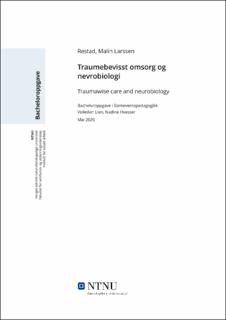| dc.contributor.advisor | Lien, Nadine Hvesser | |
| dc.contributor.author | Restad, Malin Larssen | |
| dc.date.accessioned | 2023-10-12T17:22:08Z | |
| dc.date.available | 2023-10-12T17:22:08Z | |
| dc.date.issued | 2020 | |
| dc.identifier | no.ntnu:inspera:56775632:21506924 | |
| dc.identifier.uri | https://hdl.handle.net/11250/3096250 | |
| dc.description.abstract | Hvordan kan vi jobbe med den traumatiserte barnehjernen for å hindre at de traumatiserte barna blir syke voksne? For å svare på denne problemstillingen, dykker jeg i denne oppgaven dypere inn i traumefeltets kompleksitet og utfordringer. Hvilke konsekvenser har det for hjernen å bli utsatt for traumer, og hvordan kan vi forstå de?
Oppgaven er basert på litteraturstudium, og tar for seg både den nevrobiologiske delen av komplekse traumer, utviklingspsykologien samt hjelperens rolle i møte med traumeutsatte barn. Samtidig belyser oppgaven sentrale deler av traumefeltet, og gir innsikt i hvilke verktøy det er viktig å ha med seg inn i møte med de traumatiserte barna. Kunsten å kjenne seg selv og sine reaksjonsmønstre har stor innvirkning på kvaliteten i våre møter med andre mennesker, og særlig med traumatiserte barn. Kombinasjonen av nevrobiologi og utviklingspsykologi er helt avgjørende for å forstå grunnmuren i traumeomsorgen,
og vi har sårt behov for fagkunnskap på området for å kunne se og møte disse barnas behov. | |
| dc.description.abstract | How can we work with the traumatized child brain to prevent the traumatized children from becoming ill adults? To answer this issue, I will delve deeper into the complexity and challenges of the trauma field. What are the consequences for the brain of being traumatized, and how can we understand them?
The thesis is based on literature studies, and deals with both the neurobiological part of complex trauma, developmental psychology and the role of the helper in dealing with trauma-exposed children. At the same time, this thesis illuminates key parts of the trauma field, and provides insight into what tools it is important to bring into meetings with traumatized children. The art of knowing oneself and our own reaction patterns has a major impact on the quality of our encounters with other people, and especially with traumatized children. The combination of neurobiology and developmental psychology is crucial to understanding the foundation of trauma care, and we are in dire need of professional knowledge in the field to be able to see and meet these childrens needs. | |
| dc.language | | |
| dc.publisher | NTNU | |
| dc.title | Traumebevisst omsorg og nevrobiologi | |
| dc.type | Bachelor thesis | |
